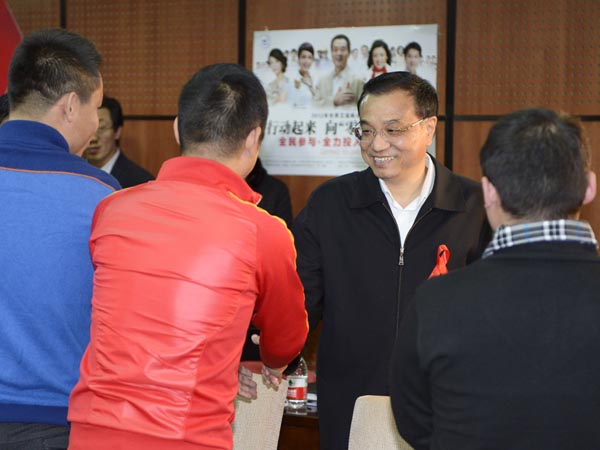
Vice-Premier Li Keqiang vowed more support, especially in registration and funding, for grassroots organizations committed to combating HIV/AIDS.
Li pledged the greater support during a meeting on Monday with representatives of non-government organizations helping to combat HIV/AIDS.
|
 |
|
Vice-Premier Li Keqiang meets representatives of NGOs that are helping to combat HIV/AIDS in Beijing on Monday. Some of the representatives are HIV-positive. [Liao Pan/China News Service] |
"Civil societies play an indispensable role in the national battle against HIV/AIDS, particularly in better reaching out to vulnerable groups, and the government should support them in funding, registration, and boosting their capacity," he said after greeting and meeting the representatives, some of whom were HIV positive.
He suggested adopting a model where health authorities buy services from these organizations to help fund their work and "a special fund would be set up to support their AIDS intervention efforts," he noted.
China has about 1,000 groups dedicated to battling HIV/AIDS, but a majority were unregistered and worked outside the law. Most relied on donations, mainly from overseas.
With status granted by civil affairs administrations, non-government organizations enjoy favorable policies regarding taxation and donations, according to Thomas Cai, who heads AIDS Care China, a Guangzhou-based organization that provides support to AIDS patients and their families.
His 10-year-old organization can cover more than 10,000 people but remains unregistered.
In response, a key AIDS official with the Ministry of Health revealed on Wednesday that authorities will make it easier for civil societies committed to combating HIV/AIDS to register and operate.
A ruling allowing this will be issued jointly by the ministries of health and civil affairs at the end of the year or early next year, said Sun Xinhua, a division director of the Health Ministry's disease prevention and control bureau.
"That initiative will help facilitate their work in AIDS control, given that the difficulty in registration has long been considered the biggest obstacle for these groups," he said at a media briefing on Wednesday.
Under existing regulations, a group cannot be registered as a legal social group without a government agency available to supervise it.
However, few want to deal with social organizations for fear of possible trouble, said Cai.
"Without the status of a legal non-government organization, we couldn't open a bank account and had great difficulty receiving donations," he said.
Cai said civil societies, many of which were set up by HIV/AIDS sufferers, are more likely than government health workers to reach out to victims or those at particularly high risk of infection.
From January to October, China reported 68,802 new HIV/AIDS cases.
Of these, nearly 85 percent were infected through sex, including 21.1 percent through gay sex.
Wu Zunyou, director of the National Center for AIDS and Sexually Transmitted Diseases Control and Prevention, said infections from gay sex have been rising.
Civil societies could play an indispensable part in the nation's HIV/AIDS control, particularly in reaching out to people who are susceptible to the disease, said Minister of Health Chen Zhu, adding that the government would keep supporting social groups.
"We gave these groups support in funding and favorable policies," Sun said.
So far, the government has given more than 50 million yuan ($8 million) to support their work, he said.
Also, training has been provided regularly to such groups to help enhance their capacity, he added.
By the end of October, China had reported a total of 492,191 HIV/AIDS cases on the mainland but government estimates put the number at 780,000.
"Many remain undetected," Wu said.
Vice-Premier Li Keqiang urged government agencies to collaborate better and expand HIV screenings, particularly among susceptible groups like homosexuals and sex workers.
Last year, more than 80 million screenings took place, according to Wu.
"Better screening access will help early detection," he said.
Li ordered health authorities to further expand coverage of the free antiviral therapy among patients.
Meanwhile, "health insurance coverage of treatment for AIDS-related opportunistic infections would be gradually improved as well," he said.







